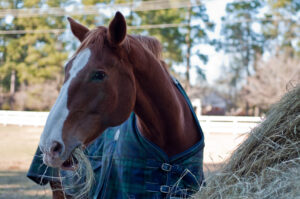 Shivering helps horses maintain their core body temperature in winter, yet the metabolic price is high, considering temperature regulation requires significant calories. Additional calories will likely be needed to maintain an appropriate body condition score (BCS) during cold snaps. Exactly how much more feed does your horse need to consume when the mercury drops?
Shivering helps horses maintain their core body temperature in winter, yet the metabolic price is high, considering temperature regulation requires significant calories. Additional calories will likely be needed to maintain an appropriate body condition score (BCS) during cold snaps. Exactly how much more feed does your horse need to consume when the mercury drops?
According to Kathleen Crandell, Ph.D., a nutritionist for Kentucky Equine Research, some horses won’t require any additional calories, whereas others may need to consume up to 25% more calories each day to maintain condition.
For example, if a horse typically consumes approximately 2% of its body weight in forage per day (equivalent to 20 lb or 9 kg of dry forage for an average 1,000-lb or 450-kg horse), then this horse could require almost 30 lb (13.5 kg) of dry forage per day in cold weather. Rather than simply feeding more of the same forage to offer additional calories, horses can be fed concentrates, fat (either as oil or high-fat supplements such as rice bran), or energy-dense forages such as alfalfa or clover mixed with their regular hay.
“Healthy horses living in regions that typically have milder winters, are maintained indoors, or are blanketed when outdoors for limited periods of time can be fed a diet similar to that fed in warmer months,” Crandell advised. Horses that may require additional feed to maintain an appropriate BCS include:
- Horses that fall into the senior classification,
- Horses with an underlying disease;
- Horses asked to perform their regular work throughout the cold season;
- Horses that reside primarily outdoors in regions with harsher winters; or
- Horses that are not routinely blanketed but do have access to shelter.
Horses maintain their core body temperatures by diverting blood flow from the skin to their internal organs, shivering, growing a thick coat, altering metabolic pathways to produce heat, and fermenting forage.
One of the key factors in determining whether or not your horse requires more feed involves frequent and precise assessment of BCS. While some owners may struggle with this process on the best of days, often underestimating their horse’s true condition and therefore overfeeding, the longer, thicker coats and use of blankets can make estimating BCS even more challenging. Nonetheless, this skill is imperative to ensure a healthy horse.
“Be certain to use your hands to feel for fat cover rather than simply glancing at these regions to assess BCS,” advised Crandell.
Looking for a specific product to maintain an appropriate BCS in the winter? Contact us, we can offer solutions for your horses.
Source: Kentucky Equine Research
